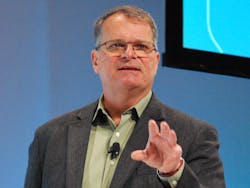PlantPAx advances digitalization, staffing and sustainability
When multiple, earth-shaking difficulties are bearing down simultaneously, it’s good to have a friend with the solutions and expertise that can provide some shelter. Operators, engineers and managers in all industries are facing a multi-pronged, perfect storm of workforce shortages due to the Great Resignation after the COVID-19 pandemic at the same time they’re trying to digitally transform from hardware to software, networking and cloud-computing, as well as deal with increasing demands for more sustainable manufacturing practices.
“Sustainability is a challenge for everyone with new pressures and rules that touch all industries, but Rockwell Automation has process controls and data analytics that can help,” said Jim Winter, global process business director at Rockwell Automation. “We were also making progress on prior labor shortages, but then COVID-19 and the great resignation hit, so we’re trying to address it with more network links, intuitive systems, remote connections and autonomous capabilities.”
Winter and Dave Rapini, global business manager for PlantPAx at Rockwell Automation, delivered the keynote address, kicking off Process Solutions User Group (PSUG), just before the opening of Automation Fair 2022 in Chicago. More than 750 visitors from 15 countries and 20 process industries attended 14 customer sessions, 30 technical sessions and eight hands-on labs at PSUG.
Handling headwinds
“Supply-chain delays mean users have to make substitutions and change tuning, optimization and plant systems, so they need more plug-and-play devices to handle them,” explained Winter. “Backlogs mean users have much less tolerance for off-spec products and downtime, and they must be even more productive and as fast as possible. More network connections make it even more crucial to follow IEC 62443 and other cybersecurity standards. Changing workforces need standards that can improve connectability and emulation for training. And standards like the Open Process Automation Standard (O-PAS) and NAMUR’s Module Type Package (MTP) are entering more of the specifications required by users.”
Technical and system treatments
One of the main remedies that Rockwell Automation prescribes for many of these challenges has been its PlantPAx distributed control system (DCS), which made several big strides over the past two years. It gained a process controller as part of its recent PlantPAx 5.0 release, while PlantPAx 5.1 was launched this past summer, and featured FactoryTalk emulation software for the process controller. However, the big news is the unveiling of PlantPAx 5.2, which will be highlighted by the fully redundant FLEXHA 5000 I/O platform. It has all analog and digital inputs and outputs on one card, which will let users terminate wires and program them electronically, saving huge amounts of time on configuration, startups and spares management.
In addition, Winter reported that Rockwell is working on combining hardware, software and services for better outcomes in industries and applications, such as energy management, mining, brewing, batch analytics, burner management and single-use technologies. “These solutions help users get to market faster and work together better,” added Winter.
Open standards for open solutions
To help end users achieve more high-value goals without having to work as hard, Rapini stated that Rockwell Automation’s technologies can handle many of their traditionally manual tasks—freeing them to concentrate on what’s most important to them. Programmable logical controllers (PLCs), such as ControlLogix and CompactLogix, accomplished many of these efficiencies over the years, but now they’re gaining new software and capabilities that are allowing them and their users to make even greater gains. These features include embedded software objects, integrated HART communications, ownership and arbitration functions, graphic frameworks, regulated industry compliance, automatic hardware diagnostics, alarms in object, smaller server footprints, enabled analytics and cybersecurity.
“Our R&D focuses on open technologies based on open standards, which allow easier integration and collaboration; low-code/no-code software with reusable software blocks, so users don’t have to spend so much time on programming; and digital transformation that enables connections and lets users add value,” said Rapini. “For instance, low-code/no-code extends HART features that couldn’t be easily deployed before and lets users extract messages, migrate them to controls and even create graphics. These tasks are now just a check box. This is just configuration, not coding.”
Rapini stated that low-code/no code also enables:
- automatic diagnostics that can be pushed directly to databases
- embedded software objects for simpler architectures in Rockwell Automation’s controllers
- ownership and arbitration functions, which run behind the scenes, so software updates can be rolled out easily to groups of devices.
Rapini reported that Rockwell is also working with other open standards, such as OPC UA for communications, ODVA and NAMUR’s joint process special interest group (P-SIG), and MTP and MQTT publish-subscribe protocol for skid integration.
“With this November’s release of PlantPAx, we’ll have remote alarming. And, in next year’s release, ODVA and NAMUR’s P-SIG initiative will cover basic instrumentation, which will let users quickly create the reusable code they need,” said Rapini. “Meanwhile, MTP for skid integration will allow OEMs to configure files that can ride on their skids, until a DCS discovers them. This will make integration much easier.”
In addition, PlantPAx has also gained a scalable batch solution that’s based on the ISA88 batch standard. It features:
An instruction-based ISA-88 Sequencer that bring essential batch execution to the controller
SequenceManager software that provides independent operation of a single unit on skid controllers
FactoryTalk Batch software with a comprehensive batch-management platform that solves issues about traceability and compliance.
Many of these functions can be handled by FLEXHA 5000 because it’s fully redundant, has built-in diagnostics, is available with smart junction boxes, has individual channel isolation, offers individual channel universal I/O, enables ease of wiring and is configured for simplex or duplex operating.
“PlantPAx and FLEXHA 5000 also enable digitalization and IT and OT convergence because they provide users with the advantages of their diagnostics and reporting,” concluded Rapini. “Ten years ago, we talked about Cisco and Stratix switches, and using Ethernet to reach the enterprise. Now, we’re able to talk about how they can add value further up the organizational stack; provide data structures and models for all the software in an application; let users pick their top 12 parameters and put them in a database; and help data managers do what they want and get the reports they need. We can now think of the DCS as doing more than just basic control. With PlantPAx, it can securely do data analytics and multidisciplinary control, and make multiple deployments easier to use.”



